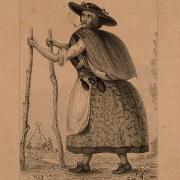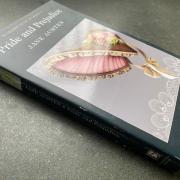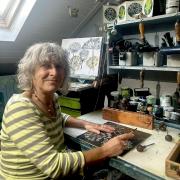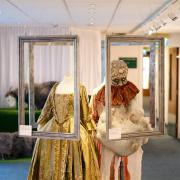The anxieties of a young man newly arrived in the big city and pleas to his dad for money to pay rent and buy fashionable new clothes; nights out, romance and work challenges, Ben Browne could be any son today finding his way in a new life and taking his first steps on the career ladder.
In fact, his requests home were written more than 300 years ago and sent from London to his father in Westmorland.
Ben was 27 when he set off from Troutbeck in 1719 on horseback on the 300-mile journey to London to start his training as clerk to a lawyer. From the moment he arrived he began writing letters home to his family with details that paint a vivid picture of a young country man discovering the pleasures – and anxieties – of the big city.
Around 65 of his beautifully scripted letters have survived and are now on display at Townend, in Troutbeck, a National Trust property.

Townend was in the Browne family for more than 400 years from 1525 to the 1940s.Through the centuries, generations amassed a diverse collection of handwritten papers ranging from legal documents and letters to shop receipts and notebooks which provide a rich insight into the social history of rural Westmorland.
They also reflect what was happening in London at the time, including a glimpse of the social unrest. Witnessing violent protests by Spitalfields silk weavers against imports of calico from India, Ben described “very great mobbing by the weavers of this town…they are starved for want of trade”.
By the time he was installed in his new lodgings with his employer, lawyer Richard Rowlandson, his letters home frequently requested money as he began to feel the pinch in the expensive capital city.
He asked for funds to help pay his rent, and to buy stockings, breeches, wigs and other items necessary to his new life. He hoped his parents would not think him extravagant, but he wanted to look the part, because “my Cloaths which [I] have now are but mean in Comparison [with] what they wear here”.

Despite money worries, Ben wrote of a lively social life and occasions spent eating and drinking with friends, especially around Fleet Street, close to the Inns of Court and his employer’s lodgings. His descriptions of time spent with friends are reminiscent of scenes immortalised in the satirical prints of the time by William Hogarth.
In one letter, young Ben sprang what he feared would be a considerable surprise on his father when he announced he had married the maid of his employer, Mary Branch, from St Albans, having courted her in secret.
He begged his father, also called Ben, for his blessing and forgiveness. From a letter he wrote soon after, reflecting the closeness of father and son, old Ben had accepted the situation and broken the news successfully to his son’s stepmother.
Young Ben was grateful and wrote that he “shall ever acknowledge the many and endearing kindnesses and affectionate advices by me rec’d from so indulgent and affectionate father and mother”.

Friends and acquaintances of Ben back in Troutbeck appear to have sent word to him on occasions to acquire fancy goods on their behalf while he was in the city.
He sent several snuff boxes back to his parents, and in one letter home Ben listed all the requests he had fulfilled including a wig trunk, sealing wax and a silver thimble, a “Cap for Parson Sawrey and two necklaces for him”, “Linnen for a gown and cape for Mrs Birkett Merrers” and “Chocolate and Coffee for my mother”.
However, young Ben had long office hours, mentioning working from 8am until 8pm copying legal documents. He cannot hide his annoyance in one letter when he discovered his father had apprenticed him to his employer for five years, rather than a short period of training. At the prospect, he bemoaned: “I have Lost the prime of my Youth.”
The letters also revealed that he kept some considerable expenditure from his father, namely his passion for buying books and building a gentleman’s library. A study of the many books in Townend’s collection today reveal his secret since a number were purchased, dated and with many annotations in his hand, during the years he was in London.
The titles include numerous romances, fiction books and Shakespeare plays, but how the perpetually short of money Ben was able to afford them remains a mystery.

Emma Wright, collections and house manager at Townend, says: “Young Ben was in London for 16 years and his letters are full of fascinating details of his life during this time, with his numerous requests for money towards his keep and for what he needs to live a fashionable lifestyle, not to mention some bombshell surprises like his secret marriage.
“While old Ben kept dozens of the letters he received from his son, young Ben only seems to have kept a few from his father. So, we have the references he makes in his own letters to things his father has written to him to get an idea of how Ben senior was responding to various pieces of news.
“In one surviving letter from old Ben, though, we discover he is keen for his son to find out a bit more about a rumour he has heard of a duel in London between a local Troutbeck man and a Londoner.”
Emma continues: “These letters are so relatable, and they show nothing has really changed. Like the emails or text messages they may receive today, many parents with a child going off into the world will appreciate how Ben senior must have felt getting news of them and requests for help, while any young person who has arrived in a big city to study or work will recognise the situations in which young Ben finds himself.”
The volume containing the correspondence between father and son – leather bound in the late 19th century by a member of the family, George Browne – was in need of conservation and was repaired by book conservator Ann-Marie Miller before going on display.
Ann-Marie says: “It has been a pleasure to tread the same steps as George Browne, as I have charted, and then reconstructed, his work as a bookbinder. He took a great deal of care to preserve the correspondence between father and son and I have tried to honour his intentions. I feel as if I have also got to know young Ben, with his solicitous turn of phrase and the flourish of his handwriting.”
Emma adds: “I hope visitors of all generations will enjoy finding out more about how young Ben made his way in the world with the help of his father and seeing how their personalities come through in these letters. What emerges from this correspondence just goes to show the timeless nature of familial relationships.”
Townend’s display of letters, along with other items in the Browne family archive, runs until November 1. For opening times and further information, nationaltrust.org.uk/townend












![Julie Carter [Jessie Leong]](/resources/images/128x89/1x/18534684.jpg)
![Julie Carter [Jessie Leong]](/resources/images/180x180/1x/18534684.jpg)




![Eastman Johnson's The Lord is My Shepherd, 1863, an anonymous black man seated and reading [courtesy of the Smithsonian American Art Museum]](/resources/images/128x89/1x/18534983.jpg)
![Eastman Johnson's The Lord is My Shepherd, 1863, an anonymous black man seated and reading [courtesy of the Smithsonian American Art Museum]](/resources/images/180x180/1x/18534983.jpg)








